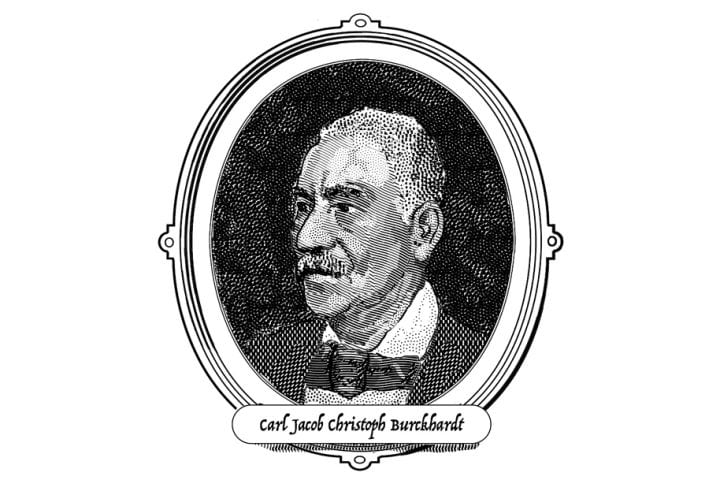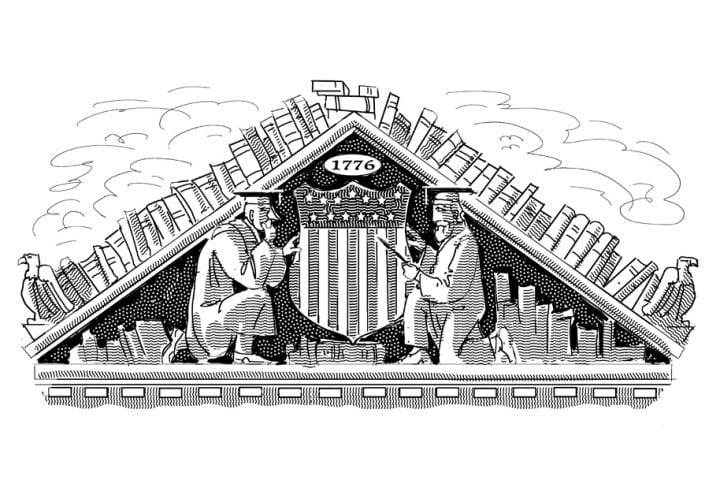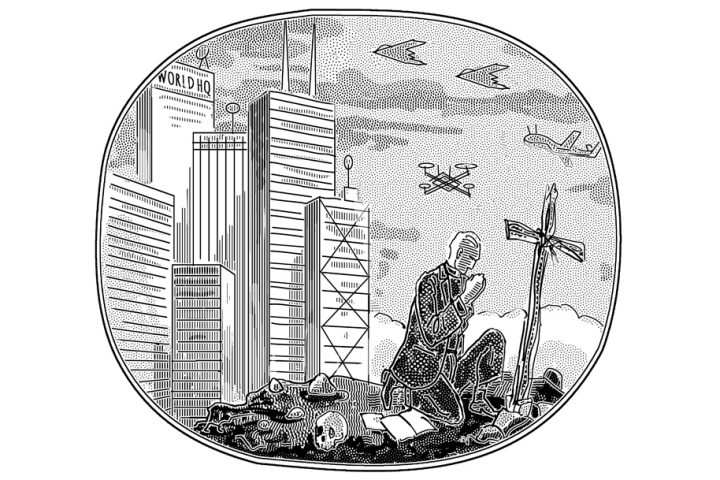Books Reviewed
Breadth of knowledge, intellectual acuity, and a scintillating writing style are just a few of the qualities that make Roger Scruton one of the leading thinkers of our time. Scruton’s oeuvre is vast, and, at age 72, is only growing. Along with some 40 books on such subjects as philosophy, religion, architecture, music, wine, and politics, he has written four novels and two operas.
For the readers of this journal, there is the added attraction that Scruton is a conservative—not casually so, but as someone who has proudly worn the label and engaged in the battle of ideas for over half a century. He has the scars to show for it, too, having been ostracized early on from academic life in Britain and having had one of his works face the modern equivalent of a book burning. (Threats by angered intellectuals led a prominent publisher to stop offering it for sale.) Scruton was a target of political correctness before the term existed. Yet from all appearances he has borne this criticism with remarkable equanimity, showing malice toward only a few and charity for most. At this point, in 2016, Britain’s intellectual establishment is finally relenting somewhat, admitting Scruton back to the edges of the fold.
* * *
With his abundance of intellectual capital, Scruton has always had the satisfaction of being able to give more than he receives. In Fools, Frauds, and Firebrands, he takes on the major leftist thinkers of the past century from A (Theodor Adorno, of the famous Frankfurt School of critical theory in the 1930s) to Z (Slavoj Žižek, the contemporary Slovenian thinker touted by Foreign Policy as “a celebrity philosopher”). The book’s title may exaggerate its polemical character. Yes, as Scruton says, the work is a “provocation,” but it also provides the most comprehensive, serious treatment to date of the development of modern leftist thought. Though in the end he is critical of all of the featured thinkers, Scruton readily expresses his appreciation for certain of their intellectual qualities. He regards Jean-Paul Sartre’s Les Mots (The Words, 1963) as a “masterpiece of autobiography”; admires Michel Foucault’s “imagination and intellectual fluency [that] have generated theories, concepts and insights by the score”; and admits Eric Hobsbawm’s series on the rise of the modern world is “a remarkable work of synthesis, seriously misleading only in the fourth volume.”
Give credit to Scruton as well for going to great lengths to try to decipher the opaque prose of the four horsemen of obscurantism: Jacques Lacan, Louis Althusser, Gilles Deleuze, and Alain Badiou. Acolytes of these thinkers who read this book might find themselves for the first time getting a sense of what their masters are actually saying—or not. Scruton’s patience, however, does have its limits, and at points he turns to unmasking the unmaskers. Scruton writes of Lacan that he “discovered the infinite power of the meaningless, when the meaningless is used to exert a personal charisma.” Lacan’s deification, which he “not only demanded, but also, to the disgrace of human nature, received,” embodies a regrettable facet of the leftist philosopher’s social position in France. Thinkers from Sartre on were able to enjoy renown by excoriating the so-called bourgeoisie, all the while expecting to be celebrated—and being celebrated—by a large portion of this same class.
Scruton’s sociological eye is impeccable as he sketches a slightly different relationship of thinker to admirers in Germany. Given that nation’s troubled experience with its philosophers in the first half of the 20th century, the contemporary leftist intellectual establishment has looked more for reassurance and respectability than for displays of brilliance. It has found the perfect exemplar in Jürgen Habermas, its leading postwar thinker, whose “barely readable but impeccably orthodox books” defend a bureaucratic version of the welfare state. The very tedium of his thought soothes the intellectual class and brings a comforting feel of normalcy. Readers of Habermas keep hoping to find more in his “theory of communicative action than his inability to communicate it,” but their quest so far has been in vain.
* * *
Scruton organizes the first part of the book by grouping the earlier thinkers by nation—Britain, America, France, and Germany. This arrangement enables him to situate their thought in a concrete historical context and, in the fashion of a sketch artist, to provide many insightful observations on the national character of each country.
His chapter on America proves to be, well, deflating. The book’s subtitle, Thinkers of the New Left, had me eagerly anticipating an intellectual journey back to my college days in the ’60s, when the movement known as the New Left—I believe the term was coined here—exploded onto the scene, managing in the brief span of five or six years to change the popular culture not only in America but eventually in much of the world. Its effects continue to reverberate to this day. Yet Scruton never once mentions this movement, devoting his chapter instead to the clever but ultimately superficial economist John Kenneth Galbraith, and to the tendentious legal thinker Ronald Dworkin, whose thought will not long be taken seriously. His omission offended my insatiable need of recognition for my own nation, until, revisiting the subtitle, I was forced to acknowledge that he limited his topic to “thinkers.” And here the stunning fact dawned that this vast movement, which emanated from inside the American academy, did not produce a single book or article of note by a native author that has stood the test of time. Its leading thinkers were two professors drawn from our most prestigious universities: Charles Reich, from Yale, author of The Greening of America (1970), which celebrated the emergence of “Consciousness III” with its foundational theme “I’m glad I’m me,” and Timothy Leary, from Harvard, the mind-numbing champion of drug use who promulgated the great ontological proposition, “Turn on, tune in, drop out.”
* * *
In turning from the two English-speaking nations to France and Germany, Scruton passes a frontier and enters into the territory of philosophy. It was from this continental redoubt that the thought that drives the contemporary Left was launched. In France, the seminal figure was the Russian émigré Alexandre Kojève, who in the 1930s introduced a revival of Hegelianism, mixed in some ways with existential themes. For those already on the left, Kojève’s thought introduced a new intellectual apparatus that was placed on top of Marxism. It led to the subsequent explorations of radical individual freedom and alienation, and to the myriad permutations, still ongoing, of self and other. In Germany, one of the key early thinkers was the Hungarian literary critic and philosopher György Lukács, who wrote in German and who became the inspiration of the Frankfurt School. This line of thought, aided by the discovery in 1927 of Marx’s early manuscripts, was responsible for developing what became known as “Marxist humanism,” which proved to be the last refuge of so many Western intellectuals. Here was another root of alienation, found in the supposed fetishism of money and commodities that captivated bourgeois consciousness. The critics’ disgust with the middle class’s attachment to the vacuum cleaner, the dishwasher, and the station wagon became the fuel that drove their deep metaphysical musings.
Some version of Marxist humanism lay at the foundation of the American New Left of the 1960s. And as I recall, it also provided space for many intellectuals to be Communists of a sort without swearing loyalty to the Communist Party or committing themselves to being permanent defenders of any particular form of Communism. Having already by then rejected Stalinism, they could alight, temporarily, on Maoism, or Castroism, or anything else that happened along until it proved to be too odious and disastrous. There was always a true, humanistic Marxism to be discovered beyond any actual version of it. Communism, as Sartre finally defended it, should be judged “by its intentions and not by its actions.”
This book will inevitably select its own readership. Those with little taste or tolerance for modern Continental philosophy may find some chapters difficult going, despite Scruton’s effort to state matters as clearly as possible. For readers in search of a straightforward account of Scruton’s own political thought, other works, like Culture Counts (2007) and How to Be a Conservative (2014), would be a better point of entry. Yet for a full understanding of his special form of conservatism, this book is, I think, essential. Just as Edmund Burke’s political philosophy grew out of his reaction to the radical ideas of the French Revolution, so Roger Scruton’s political philosophy has been forged in response to his encounters with modern leftist thought. The two bodies of radical thought, after all, have much in common, and it is no accident that so many on the left have drawn direct lines of filiation between Robespierre, Lenin, and Mao. For Badiou, the revolutions these men inspired are celebrated instances of the “Event” opening the way to human liberation; for Scruton, the Communist revolutions are dismal examples of terror.
* * *
Scruton’s conservatism is in many ways an inheritance of Burke’s, born of the Burkean spirit of “a disposition to preserve and an ability to improve.” Like Burke, Scruton has pointed to the dangers of modern radical modes of thought in their pursuit of an imagined ideal of a perfect egalitarian society and in their basic approach to assessing the world of politics. Long on criticisms of capitalism’s particular shortcomings—it is always easy to find flaws—modern radical thinkers abjure considering specific measures of improvement in favor of calling for transformation of the entire order. That they have done so in the face of the mountains of concrete evidence of the horrors these utopian experiments have caused is a sure sign of a new form of intellectual perversity.
Conservatism for Scruton begins at just the point where this radical thinking leaves off: “What is the alternative, and how do we frame a politics that respects and applies it?” He shows, adapting Burke’s thought, how the conservative disposition today, so far from calling for revolution in the name of a perfect equality and of a “new man,” is respectful of the common person and of his way of life, its limitations included. Scruton’s sober conservatism is at war with the “destructive fantasies,” the “false hopes,” and the “pathological hatred of the imperfect and the normal” that in the end characterize so much of modern leftist thought. Scruton is never shy about issuing warnings and offering corrections for many of the baleful tendencies of modern life. His renewed and innovative defenses of the old mechanisms of civil society, constitutionalism, markets, and the rule of law represent his effort to maintain liberty and the blessings of our civilization.




